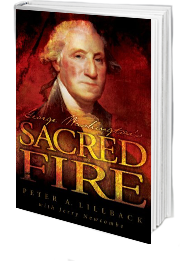Providence Today: George Washington & Slavery
Speaker 1:
You are here in Philadelphia. And this spot that you’re now viewing is where Robert Morris had a magnificent home that he gave to General Washington, who had now had become President Washington, as the government moves from New York, where Washington was inaugurated to Philadelphia, where the government would operate for the whole time that Washington was president.
Speaker 1:
This beautiful home then we might think of as being the first White House is a place where Washington dwelled. A great deal of history would’ve taken place here. Many of the customs and precedents of the presidency would’ve been right here where President Washington was.
Speaker 1:
This place is significant then, not only because of the beginning of the United States Constitution and the first president, but also it raised the very difficult reality of Washington as a slave owner.
Speaker 1:
Pennsylvania had become a free state. Slavery was now gone. It’s interesting that Benjamin Franklin as a young man had slaves, but he came to understand that slavery was wrong, and became part of the Abolitionist Society of Pennsylvania. He was against it.
Speaker 1:
Pennsylvania became a free state, but when Washington came here, coming from Virginia, we need to remember that he was the third or fourth generation of Washingtons that had slaves. That’s what he knew all his life.
Speaker 1:
And so the question came up, can Washington operate his household with his slave family, as he called them? And yes, they did. The slaves came here. In fact, we find in the excavation of this area, you’ll see where the slave quarters were. They lived in the basement. They were part of the story of Pennsylvania.
Speaker 1:
What we do need to realize, though, is that Washington’s movement with slavery went from being what I would call a cavalier slave owner to being someone who sought to end slavery in the course of his life. As a young man, we can read in his records.
Speaker 1:
He said, “Take this slave back to the West Indies. Sell him for whatever you can get: rum or lemons or money. He’s no good.” You can see human beings are just chattel property to the young Washington.
Speaker 1:
But as America enters into the conflict with the British and the Fairfax Resolves are established, the non-importation things are now put in place. And Washington said, “No more will we ever import slaves into America.”
Speaker 1:
It was a first but small step. He still had all his slaves working at Mount Vernon. But as he wrestled with the issue, he began to realize that he needed to train his slaves. And there’s a marvelous moment where the bishops of the Methodist Church, after the American Revolution meet with Washington, now a private citizen. And they say, “General Washington, you need to help us to end slavery in America.”
Speaker 1:
And he says, as they record in their minutes, he said, “Slavery must end. It is wrong. I’m not in political office. I don’t know what I can do, but I know slavery must end.”
Speaker 1:
And it’s at the end of his life, after having served as president, here he had slaves; he’s begun to train his slaves, educate them, begin to give them skills, breaking some of the Virginia law in doing so. But he does decide in his will, his last will and testament that at his death, he will free all of the slaves.
Speaker 1:
After his wife dies, he provides for their freedom, and even mentions one of his slaves, Billy Lee, who is a personal friend for years, his personal bodyguard or body slave, as he would call him. He cared for him, provided for him.
Speaker 1:
And so I like to think about Washington. Yes, we can critique him from our modern standards. But if every other Virginian and Southerner who had slaves who had followed Washington’s example, slavery would’ve ended without there being a Civil War. They would’ve freed their slaves and provided for them, and eventually slavery would’ve not been part of America. And there never would have been a battle.
Speaker 1:
Washington, at this area where we can critique him, actually was ahead of his time. In fact, he was the only slave-owning president who freed his slaves by his own initiative, without the effect of the Civil War.
Speaker 1:
So we need to realize that our standards today can critique the past. But I wonder if we understand in our own way, the moral failures that are part of our culture, or begin to think of how can we change them for the good of humanity.
Speaker 1:
Washington was ahead of his time. He was indeed a Founding Father. And even where we critique him, we can actually stand in honor of his remarkable prescience to see what freedom should be.
Speaker 1:
If you want to know more about faith and freedom, make sure you find out about our Faith & Freedom Guide. Download our free app that gives us our Faith & Freedom Tour of Philadelphia. Go to our website, providenceforum.org.
Speaker 1:
There’s so much to learn, and we’re grateful that you’re learning about God’s work through his word and his people in history. We call that Providence, and this is Providence Today.
